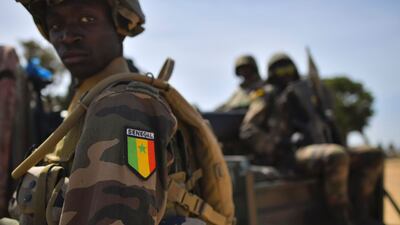BANJUL // West African troops entered Gambia on Sunday to secure president Adama Barrow’s return from neighbouring Senegal, as controversy erupted over the assurances offered to former dictator Yahya Jammeh to guarantee his exit.
Mr Jammeh flew out of Gambia on Saturday night, ending 22 years in charge of the tiny west African nation, and landed in Equatorial Guinea a few hours later where he is expected to settle with his family.
The Senegalese general leading a joint force of troops from five African nations said soldiers had nonetheless entered Gambia to “control strategic points to ensure the safety of the population and facilitate ... Barrow’s assumption of his role”.
A convoy was seen crossing the frontier at the Gambian border town of Farafenni on Sunday morning. Later, forces were seen entering the presidential compound, State House, in the capital.
Yahya Jammeh, who ruled Gambia for 22 years and refused to accept his defeat in an election last month, fled the country late on Saturday.
Forces from Senegal, which completely surrounds the former British colony’s land borders, had entered briefly on Thursday but pulled out shortly afterwards. Sunday’s troop movement was the first by soldiers from the joint force of the Economic Community of West African States (Ecowas).
Marcel Alain de Souza, a top official with the regional bloc, said pro-Jammeh elements and mercenaries remained on the ground and had open fired as troops crossed the border.
“They were neutralised,” he said, without elaborating.
Mr de Souza said the country “could not be left open” for long, however, and that Mr Barrow must be in place “as soon as possible”.
“A country must have a government, but the security conditions required the troops we have sent to secure Banjul and other towns,” he said.
Mr Jammeh had initially refused to step down after Mr Barrow won the December 1 election, triggering weeks of uncertainty that almost ended in a full military intervention.
A joint declaration issued by the United Nations, African Union (AU) and Ecowas shortly after Mr Jammeh left said the bodies would work with Mr Barrow’s government to make sure Mr Jammeh, his family and his close associates were not the target of punishment.
“No legislative measures” would be taken that would infringe the “dignity, security, safety and rights” of Mr Jammeh or his family, it said, noting that he could return when he pleased and that property “lawfully” belonging to him would not be seized.
But a top Barrow adviser, Mai Ahmad Fatty, said the declaration did not have the new leader’s approval. “I was very shocked to learn from Facebook that the document we had rejected was already posted at the websites of both Ecowas and the AU,” he said. “Gambia will neither respect nor honour what was contained in that joint declaration. We don’t consider it legally binding on us.”
Mr Jammeh personally controlled certain sections of the security forces, and since seizing power in a 1994 coup his rule has been marked by systematic rights abuses, including extrajudicial killings, torture, and arbitrary detention. Diplomats estimate he has also amassed a fortune worth up to US$3 billion (Dh11bn) through embezzlement, cronyism and allowing Gambia to be used as a stage post in the trans-Atlantic cocaine trade from Latin America to Europe.
Equatorial Guinea is not a signatory to the Rome Statute that established the International Criminal Court, meaning Mr Jammeh would not be extradited in the event he is charged with crimes against humanity or other serious offences.
With Mr Jammeh gone, all eyes will be on the Barrow administration as it makes its first steps as a government of reform and development.
“We are going to wait for Barrow at the airport all the way to State House. Before we were scared to come out,” said security guard Babacar Jallow, describing Mr Jammeh as “a killer”.
“The will of the people has come to be – at last,” said Isatou Touray, a key official in the government-in-waiting.
“Democracy is back, you can’t stop the people.”
He said the first priority would be to ensure the safe return of tens of thousands of people who fled the country in recent weeks fearing a bloody end to the crisis.
The crisis had also sparked the exodus of thousands of foreign visitors, dealing a devastating blow to a country which earns up to 20 per cent of its income from tourism.
* Agence France-Presse, Associated Press, Reuters

